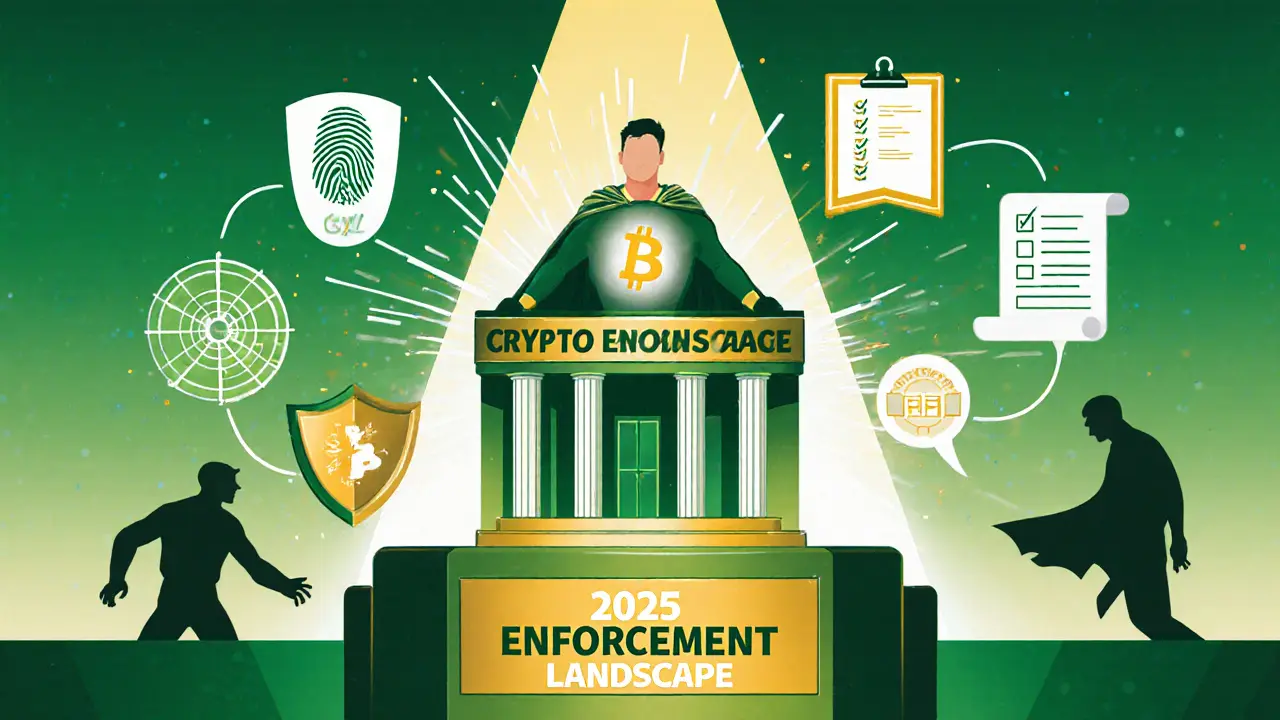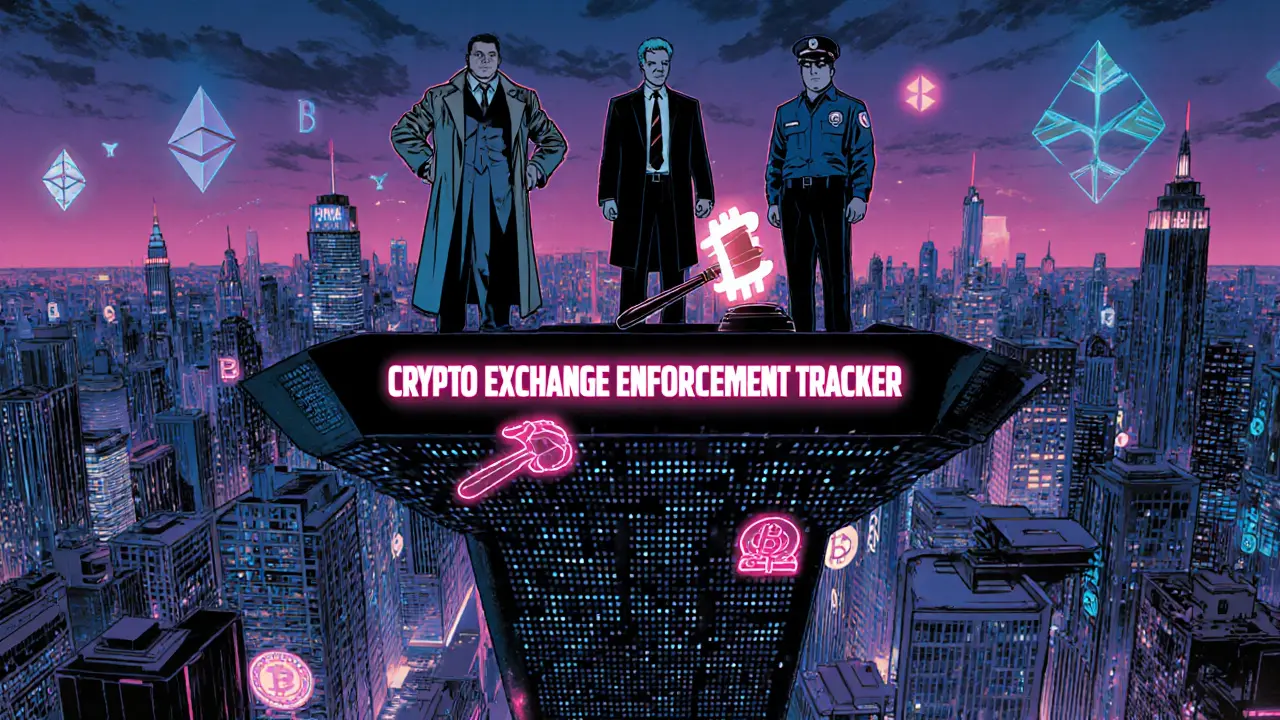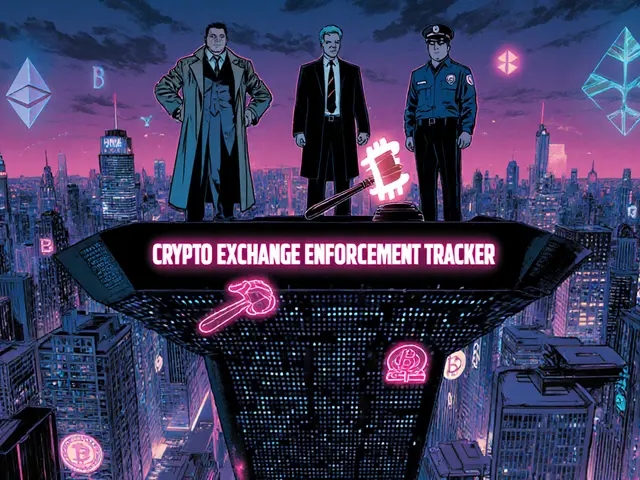Crypto Exchange Enforcement Tracker
Enforcement Summary
In 2025, global crypto exchange fines reached record levels, totaling over $6 billion in the first half alone. This interactive tool helps you understand key enforcement actions, penalties, and compliance gaps across major regulatory bodies.
crypto exchange fines have hit record levels in 2025, with regulators worldwide handing out multi‑hundred‑million dollar penalties for weak anti‑money‑laundering (AML) controls and market‑manipulation schemes. If you run a digital‑asset platform or invest in one, you’ll want to know which agencies are cracking down, why they’re doing it, and how to stay out of the crosshairs.
Quick Take
- U.S. DOJ fined OKX $500million for AML failures and illegal U.S. transactions.
- SEC secured $46million default judgment against three crypto‑mining and trading companies for a multi‑level‑marketing fraud.
- FINRA settled two broker‑dealer cases for $85000 each, targeting undisclosed crypto affiliates.
- Global AML fines topped $6billion in the first half of 2025.
- Key compliance gaps: inadequate KYC, missing sanctions screening, and failure to register as a money‑service business.
Why 2025 Is a Turning Point for Crypto Enforcement
Regulators have moved from a “wait and see” stance to an aggressive, coordinated approach. The Department of Justice (DOJ), Securities and Exchange Commission (SEC), and Financial Industry Regulatory Authority (FINRA) are each deploying specialized teams that understand blockchain‑specific risk vectors. Their combined actions have generated over $6billion in AML fines and dozens of high‑profile criminal prosecutions, signaling that non‑compliance is now an existential threat for exchanges.
DOJ’s Record‑Breaking OKX Settlement
On February24, the OKX is a Seychelles‑based cryptocurrency exchange founded in 2017 by blockchain entrepreneur Star Xu was hit with a $500million penalty after a year‑long DOJ investigation uncovered massive AML lapses. The agency found that OKX facilitated over $5billion in suspicious transfers because the platform deliberately encouraged U.S. users to submit falsified identification documents, despite publicly banning American customers.
The settlement included an $84million civil fine and a $420million forfeiture of illicit proceeds. Beyond the cash hit, OKX was forced to register as a money‑service business with the U.S. Treasury and overhaul its transaction‑monitoring and sanctions‑screening systems.
Market‑Manipulation Prosecutions in the District of Massachusetts
While the OKX case focused on AML, the DOJ’s criminal docket also features a wave of market‑manipulation prosecutions. Since October2024, the District of Massachusetts is a federal court that has become a hub for crypto‑related fraud cases has charged 17 individuals for operating wash‑trading bots that artificially inflated volumes of meme coins and newly launched tokens.
The scheme involved coordinated “match trading” where bots placed simultaneous buy and sell orders, creating the illusion of liquidity. Prosecutors argue that the practice misleads investors and skirts securities‑law safeguards, resulting in several years of prison sentences for the ringleaders.

SEC’s Multi‑Faceted Crackdown
The SEC has stayed true to its mandate of protecting investors from fraud and unregistered securities offerings. Three notable 2025 actions illustrate the breadth of its focus:
- PGI Global is a crypto‑trading firm accused of running a Ponzi‑style scheme - Founder RamilPalafox was charged with misappropriating $57million and promising unrealistic returns.
- Unicoin is a token project whose executives faced securities‑law violations for false disclosures - The SEC alleges the team sold unregistered securities and misled investors about platform security.
- MCC International Corp. is a crypto‑mining and trading firm involved in a multi‑level‑marketing fraud, alongside CPTLCoin Corp. is a sister mining operation and Bitchain Exchanges is the trading venue used to lock investors into the scheme. Together, the entities were ordered to disgorge $28.5million and pay $7.8million in prejudgment interest.
These cases underscore the SEC’s dual strategy: enforce traditional securities rules while expanding its reach into mining, staking, and “investment‑as‑a‑service” models.
FINRA’s Forward Program Targets Broker‑Dealers
FINRA has rolled out the “FINRA Forward” initiative to address the rising number of broker‑dealers offering crypto products without proper disclosures. In May2025, a broker‑dealer settled for $85000 after the regulator found that retail investors were not warned that the crypto offerings were provided through an unregistered affiliate. A second settlement in July2025 imposed the same fine for similar omissions, illustrating a pattern of enforcement against traditional financial firms entering the crypto space without robust compliance frameworks.
Common Compliance Shortfalls Across the Industry
Despite varied enforcement angles, the underlying failures are strikingly similar:
- Weak customer due diligence - Many platforms still rely on superficial KYC checks, allowing fraudulent identities to slip through.
- Inadequate transaction monitoring - Real‑time analytics and risk‑scoring engines are often under‑invested, missing large‑scale suspicious flows.
- Missing sanctions screening - Failure to flag parties on OFAC or EU sanction lists leads to severe civil penalties.
- Failure to register as a Money‑Service Business (MSB) - The DOJ repeatedly penalizes firms that avoid registration to dodge AML oversight.
- Poor disclosure of affiliate relationships - FINRA’s actions show that hiding third‑party crypto partners can trigger enforcement.
Addressing these gaps early can mean the difference between a $50million fine and a business‑ending shutdown.
Agency‑By‑Agency Comparison
| Agency | Primary Focus | Typical Action Type | Notable 2025 Penalty |
|---|---|---|---|
| DOJ | Criminal AML violations and market manipulation | Criminal prosecution, forfeiture, civil fine | $500million against OKX |
| SEC | Investor fraud, unregistered securities, securities law breaches | Civil injunctions, disgorgement, default judgments | $46million default judgment vs. MCC International, CPTLCoin, Bitchain |
| FINRA | Broker‑dealer compliance, disclosure of crypto products | Administrative settlements, fines | $85000 settlement (two separate broker‑dealer cases) |
Preparing Your Exchange for the New Enforcement Landscape
Here’s a practical checklist that translates regulator expectations into day‑to‑day operations:
- Register as an MSB with the U.S. Treasury if you serve U.S. customers, and file the required BSA reports.
- Implement tiered KYC - Use document verification, biometric checks, and ongoing monitoring for high‑risk users.
- Deploy real‑time transaction monitoring that flags patterns like rapid transfer chains, round‑trip trades, and transactions to high‑risk jurisdictions.
- Integrate sanctions screening APIs covering OFAC, EU, UK, and UN watchlists, and automatically block matches.
- Document all affiliate relationships - Ensure broker‑dealers disclose crypto partners in offering memoranda to satisfy FINRA.
- Conduct regular internal audits - Engage third‑party AML consultants at least annually to test the effectiveness of controls.
- Stay updated on regulatory initiatives - Follow SEC’s Project Crypto roadmap and DOJ press releases for emerging enforcement trends.
Adopting these steps early not only reduces fine risk but also builds trust with investors, a competitive edge in a market where confidence is scarce.

Frequently Asked Questions
What triggered the DOJ’s $500million fine against OKX?
The DOJ found that OKX deliberately allowed U.S. customers to trade on its platform by advising them to submit false IDs, failed to register as a money‑service business, and operated weak transaction‑monitoring and sanctions‑screening systems.
How does the SEC differentiate between a security and a utility token?
The SEC applies the Howey Test: if investors expect profits derived from the efforts of a third party, the token is likely a security and must be registered. Utility tokens that grant direct access to a product without profit expectations usually fall outside securities law.
What are the biggest AML compliance gaps for crypto exchanges?
Common gaps include: superficial KYC, lack of ongoing monitoring, missing sanctions checks, and failure to file suspicious activity reports (SARs) in a timely manner.
Can a broker‑dealer avoid FINRA fines by using a third‑party crypto affiliate?
No. FINRA requires full disclosure of any affiliate relationships and the associated risks. Concealing the partnership can lead to administrative fines, as seen in the 2025 $85000 settlements.
What is “Project Crypto” and how will it affect future enforcement?
Project Crypto is the SEC’s 2025 initiative to expand oversight of digital assets, including staking, mining, and DeFi protocols. It promises more detailed reporting requirements and heightened scrutiny of token offerings, meaning exchanges should anticipate tighter filing obligations.



Marketta Hawkins
December 27 2024Looks like the DOJ finally decided to bite the crypto “scam‑central” that’s been ruining American investors – nice work, but don’t expect any leniency for foreign exchanges ever again 😊
Drizzy Drake
December 29 2024I totally get why seeing a $500 million fine on OKX feels overwhelming for anyone in the crypto space. The good news is that most of those penalties stem from predictable AML gaps that you can actually fix today. First, make sure you’re registered as a Money‑Service Business with FinCEN if you have any U.S. users – that alone removes a major red flag. Next, upgrade your KYC process to include biometric verification and periodic re‑verification for high‑risk accounts. Real‑time transaction monitoring is no longer optional; you need a rules engine that can flag round‑trip trades and rapid token swaps. Integrate an API that scrapes OFAC, EU and UK sanctions lists on every outbound and inbound address. Don’t forget to file SARs within the 30‑day window; the DOJ will steamroll you if you wait too long. On the securities side, treat any token that promises returns as a security until you’ve cleared it with the SEC. Disclose every affiliate relationship in your offering documents – FINRA has already fined broker‑dealers who hid crypto partners. Invest in a third‑party AML consultant to run a quarterly audit; the cost is tiny compared to a half‑billion‑dollar settlement. Train your compliance team on the latest “Project Crypto” reporting requirements, especially for staking and DeFi services. Set up an internal whistleblower channel so employees can flag suspicious behavior before regulators do. Document every policy change and keep a changelog that auditors can review in seconds. Remember, the regulatory landscape is moving fast, but a proactive compliance culture will actually become a market differentiator. Stay calm, stay compliant, and keep building the trust that will attract the next wave of institutional investors.
AJAY KUMAR
January 1 2025Finally! The U.S. is showing the world that we won’t let offshore “crypto cowboys” run amok while our taxpayers foot the bill – justice is being served, and it’s about time someone put the limits on those foreign schemers.
bob newman
January 3 2025Sure, blame the “foreign schemers” while the same agencies cozy up with the big exchanges that’re secretly funded by the deep state – classic dup‑up, tone‑deaf narrative.
Anil Paudyal
January 5 2025yeah, just add proper kyc and u’re good.
Kimberly Gilliam
January 8 2025Another day, another fine – such a surprise that regulators actually care about crypto.
Jeannie Conforti
January 10 2025Hey folks, if you’re looking at the OKX case here’s a quick cheat‑sheet: register as MSB, use real ID checks, watch the sanctions list, and keep an eye on transaction patterns – it’s not rocket science, just solid basics that will keep you out of the news.
Dale Breithaupt
January 12 2025Great rundown – compliance isn’t fun but it’s cheaper than a $500M hit.
Rasean Bryant
January 15 2025Staying ahead of regulators is the smartest play; invest in compliance tech now and you’ll save both money and reputation later.
Angie Food
January 17 2025All this hype is just regulators trying to control a market that’s already decentralized – they’ll never stop crypto.
Jonathan Tsilimos
January 20 2025The enforcement paradigm shift underscores the necessity for comprehensive AML/KYC frameworks aligning with FinCEN statutory mandates.
jeffrey najar
January 22 2025For anyone building a new exchange, start with a solid compliance charter, hire a CCO early, and run regular stress tests on your monitoring systems to catch anomalous flows before they become crimes.
Rochelle Gamauf
January 24 2025It is evident that only entities possessing rigorous governance structures will survive this intensified regulatory onslaught; mediocrity is no longer tolerable.
Jerry Cassandro
January 27 2025I’m curious how smaller startups plan to fund all these compliance upgrades without charging users insane fees.
Parker DeWitt
January 29 2025Regulators love the drama 🎭 but the real innovation happens off‑grid – keep building it, they can’t stop that.